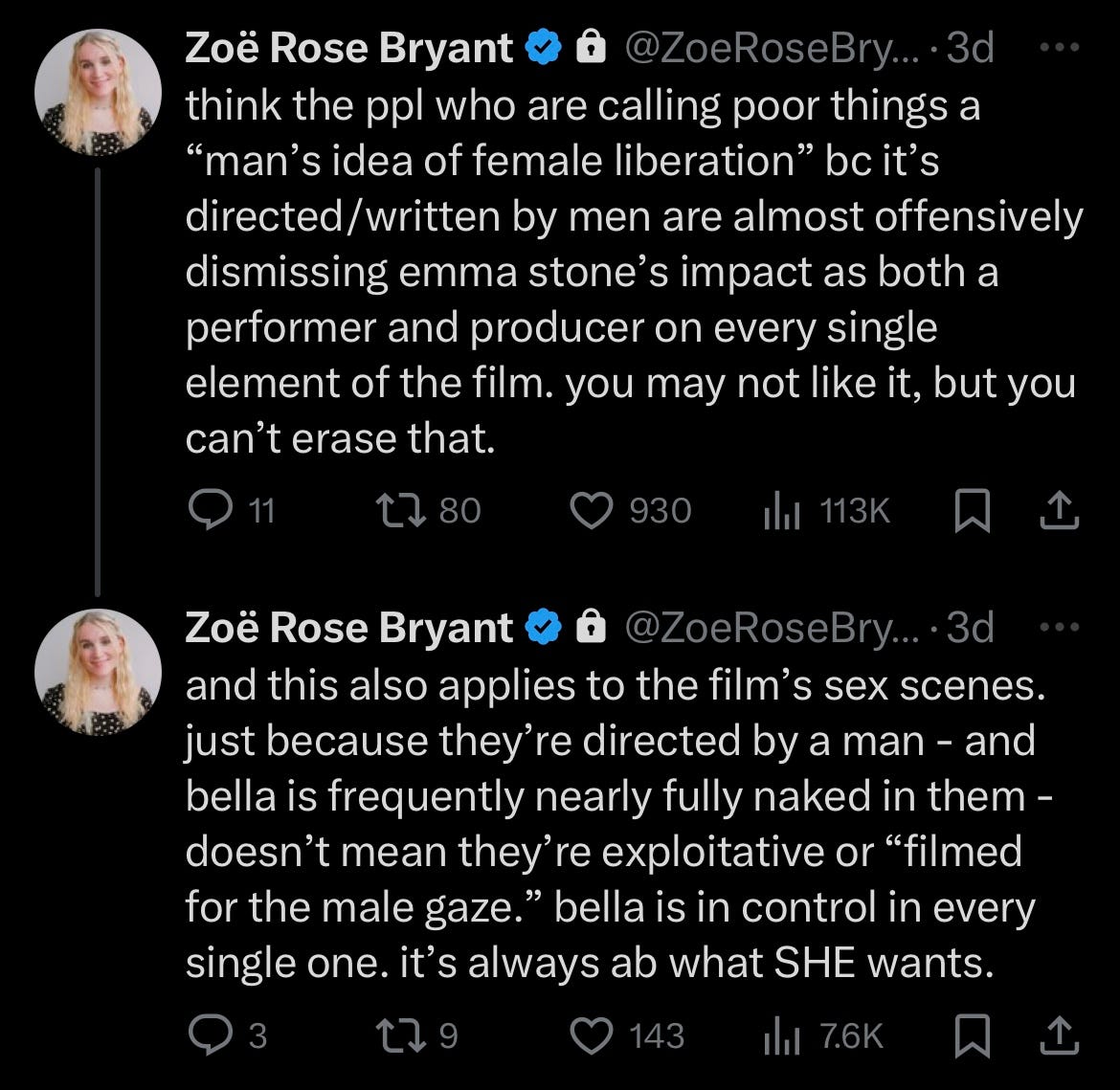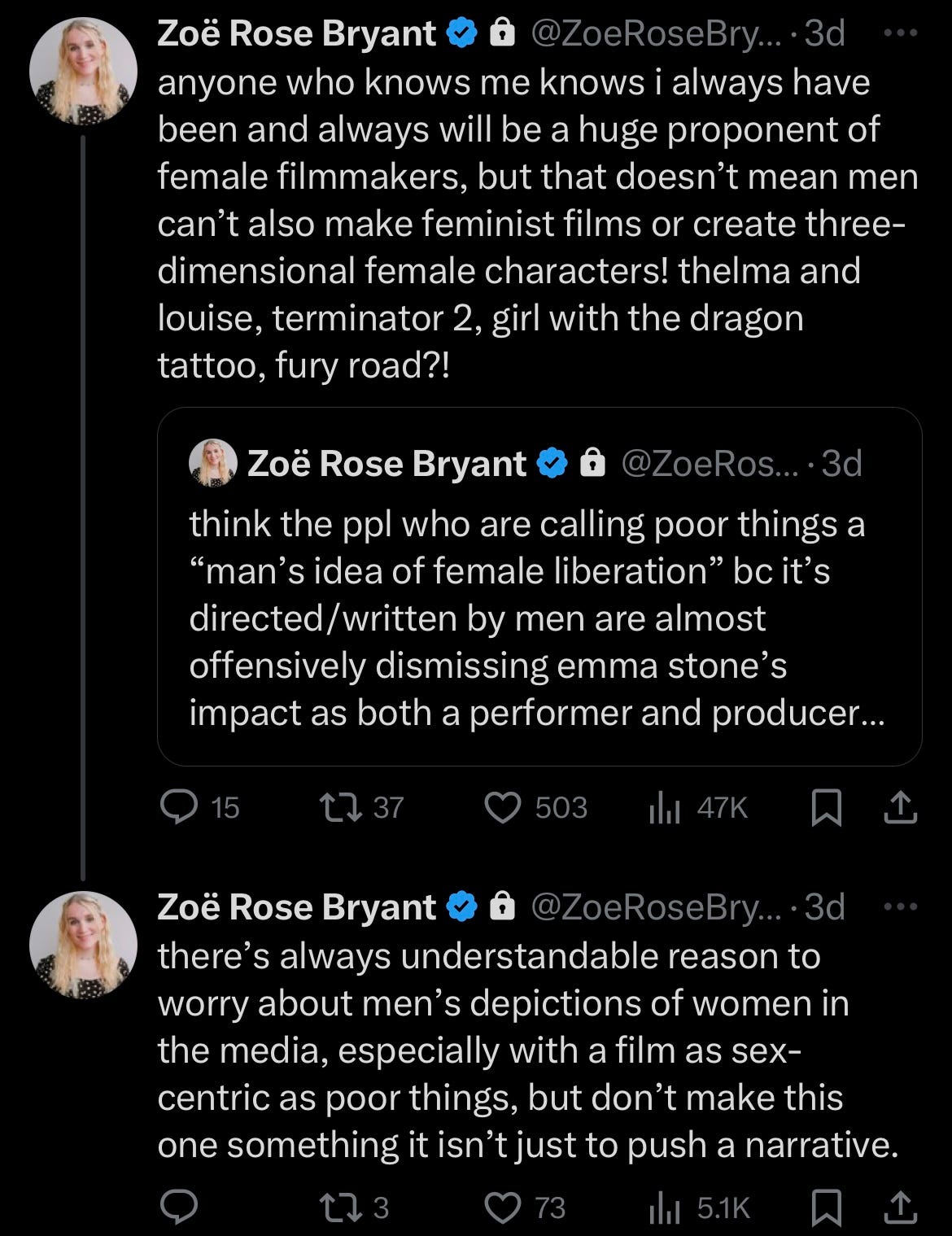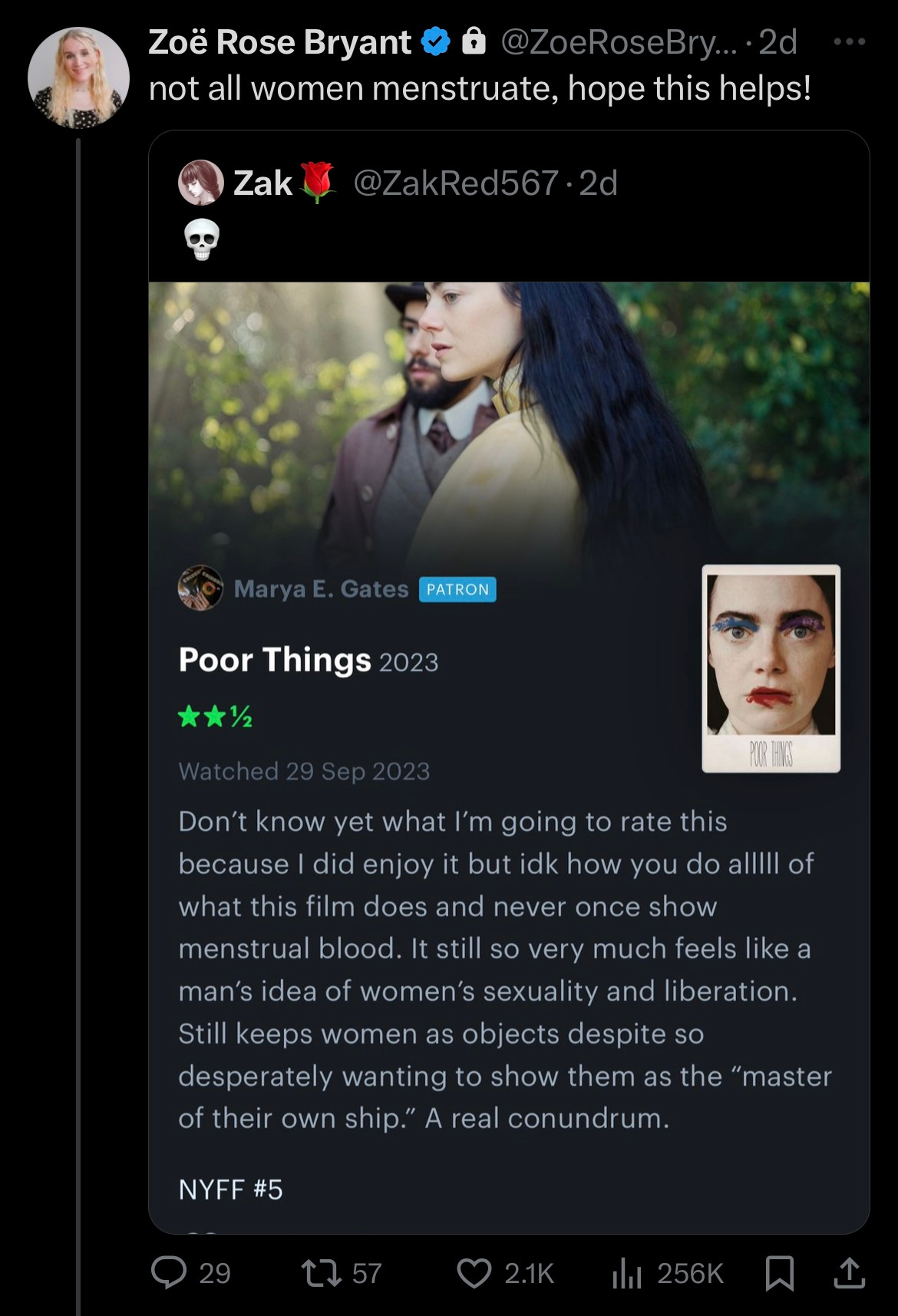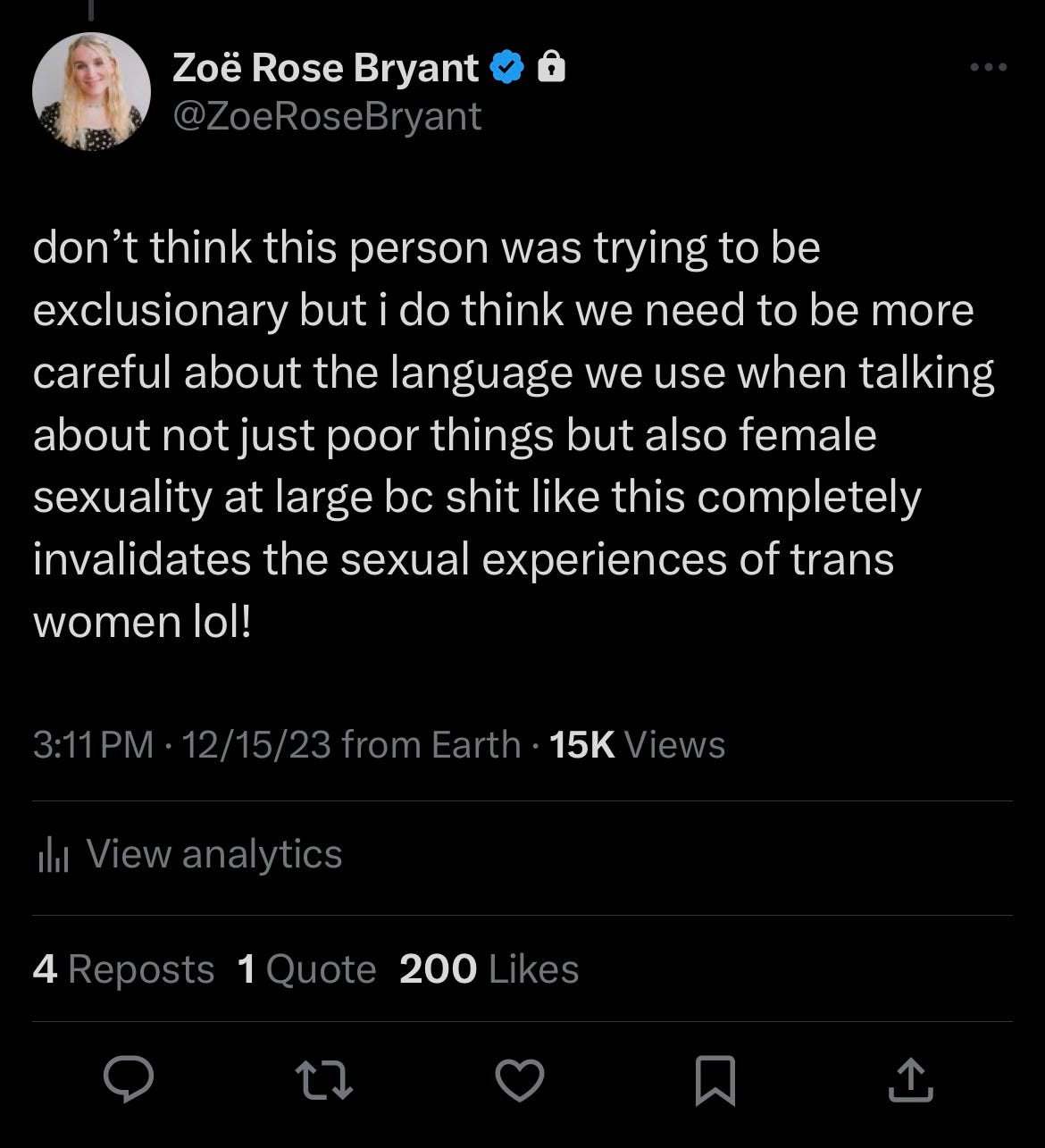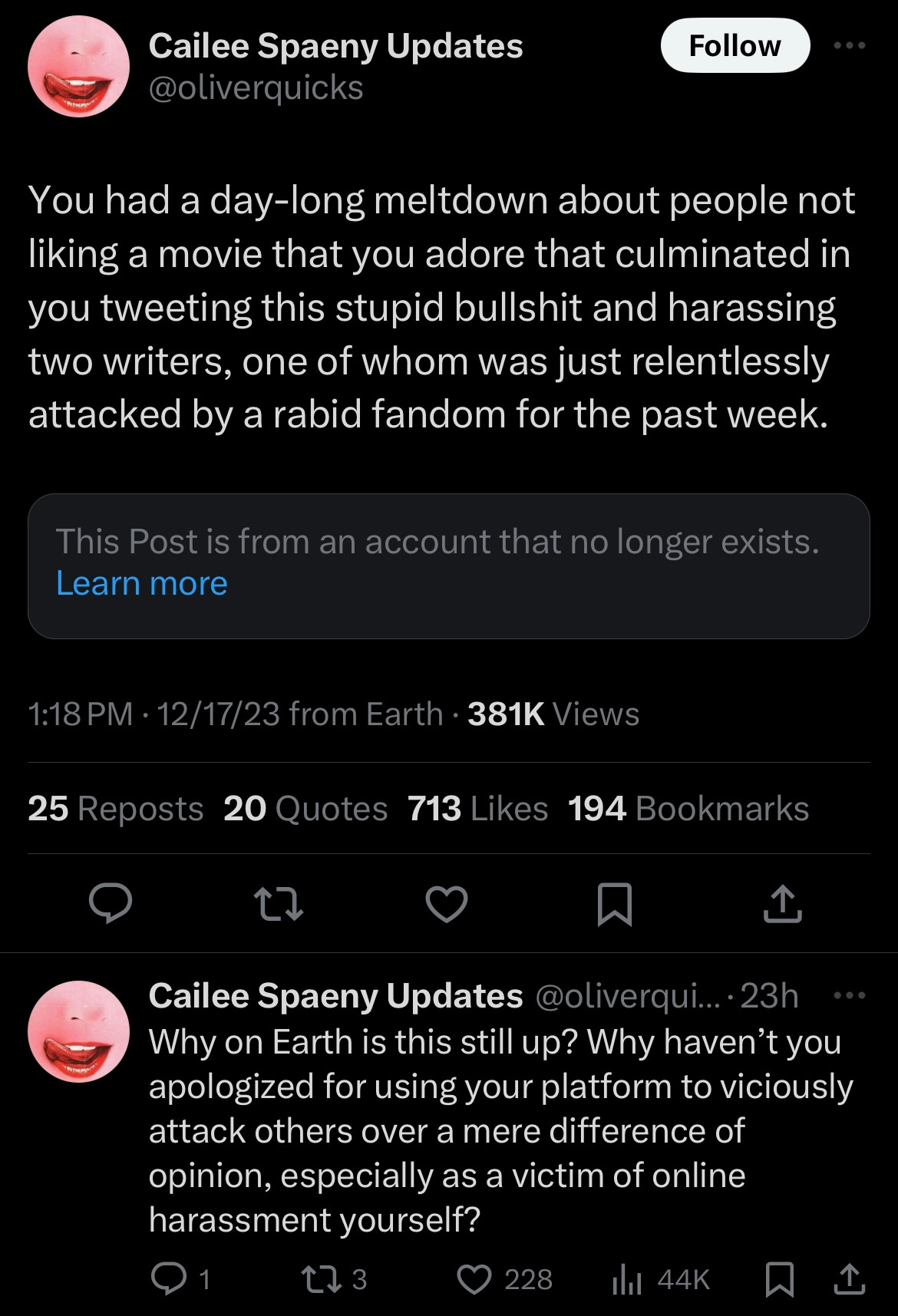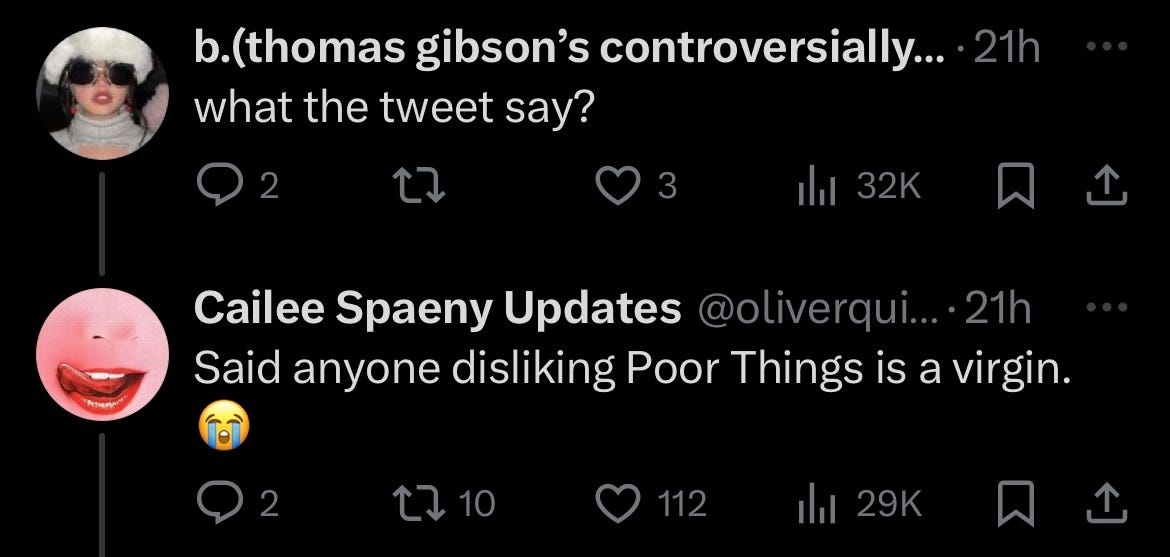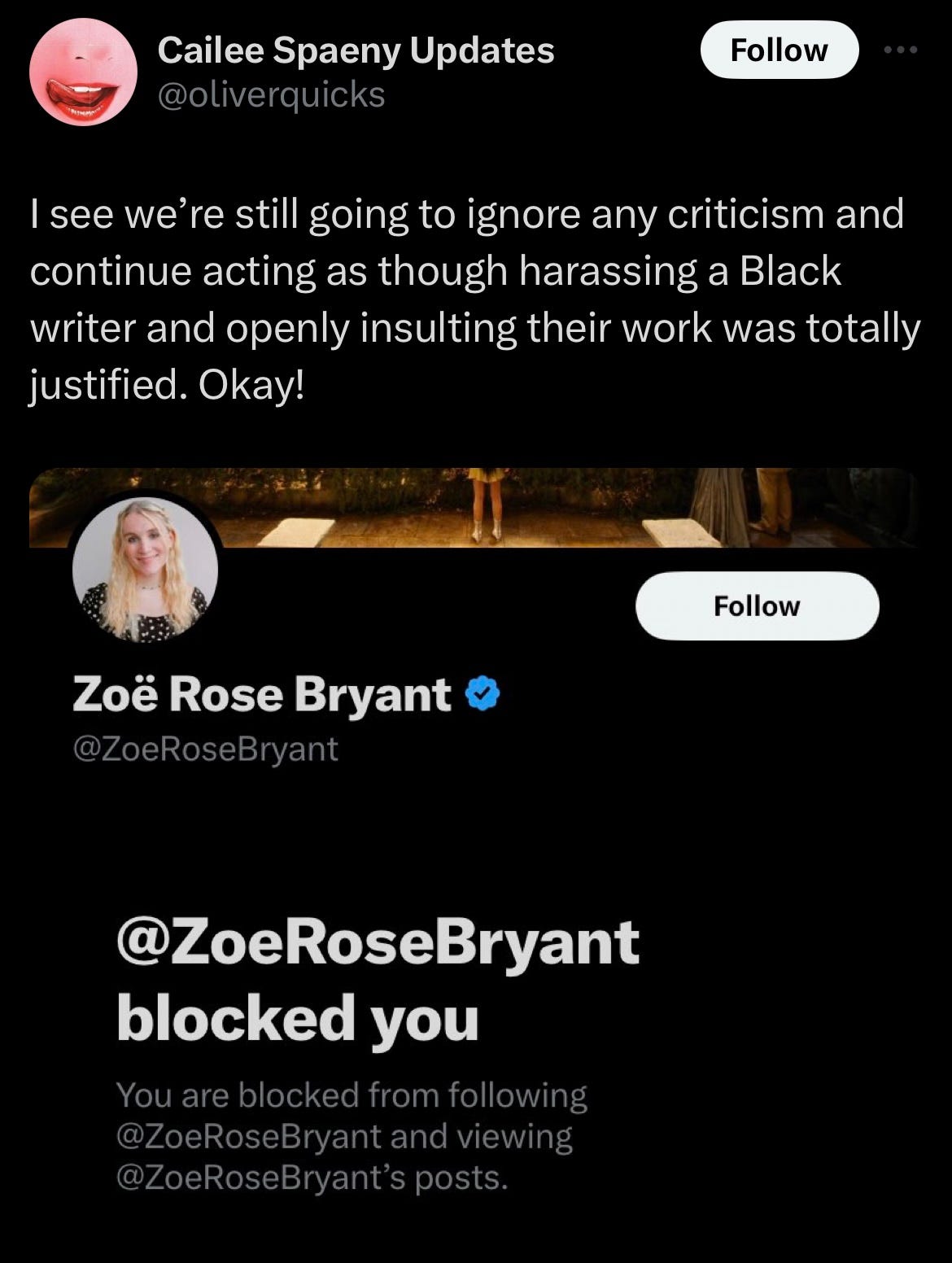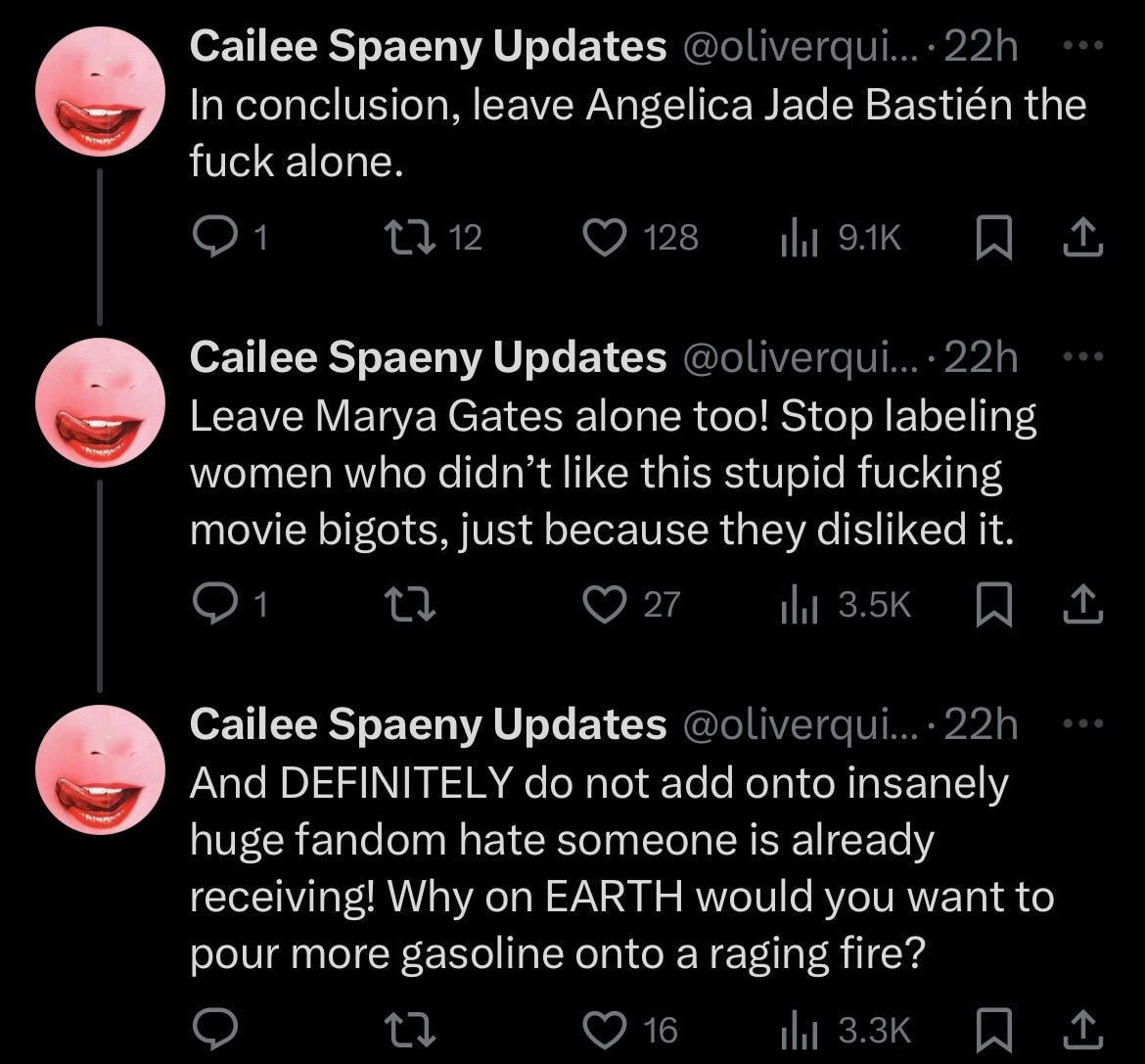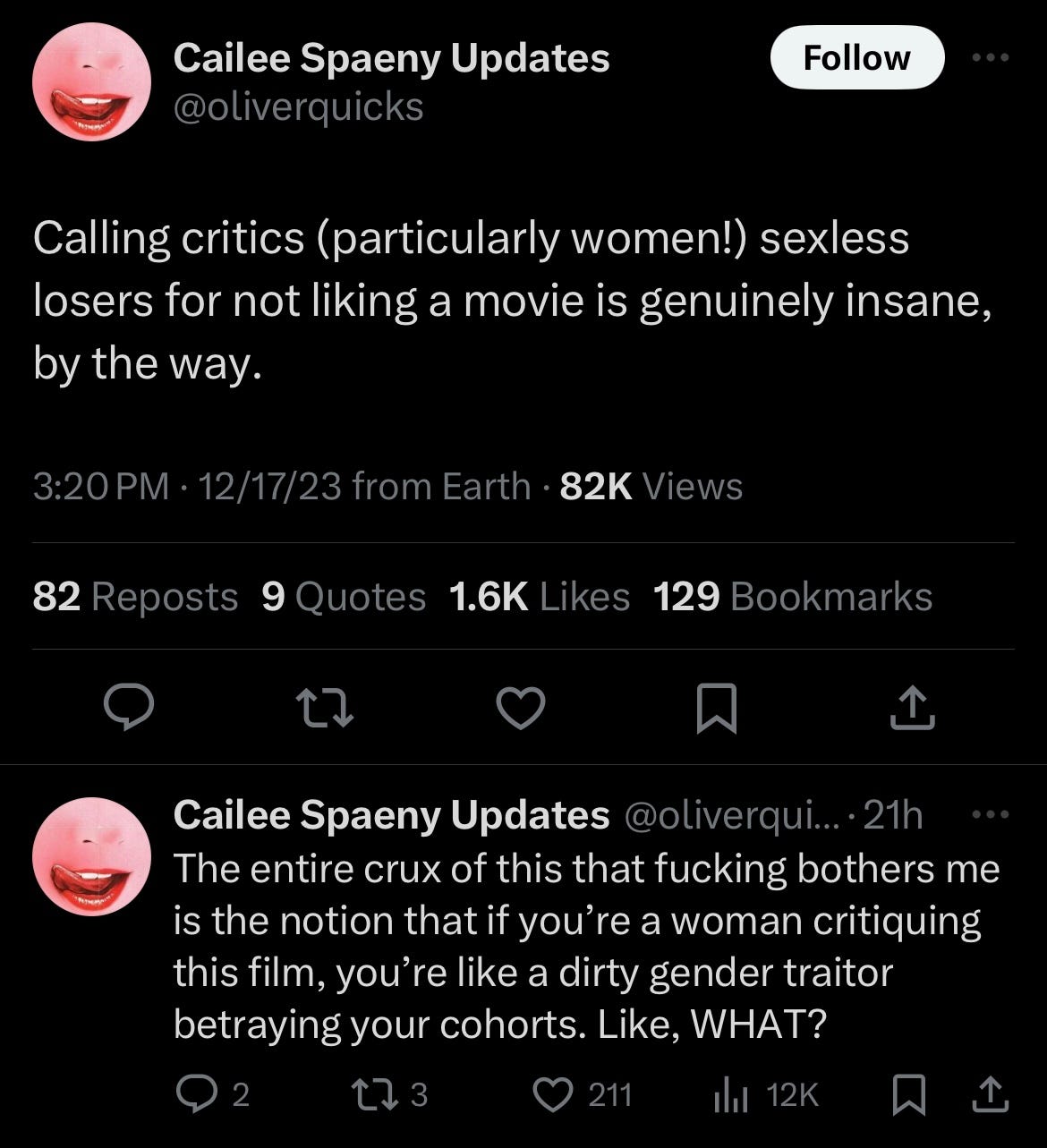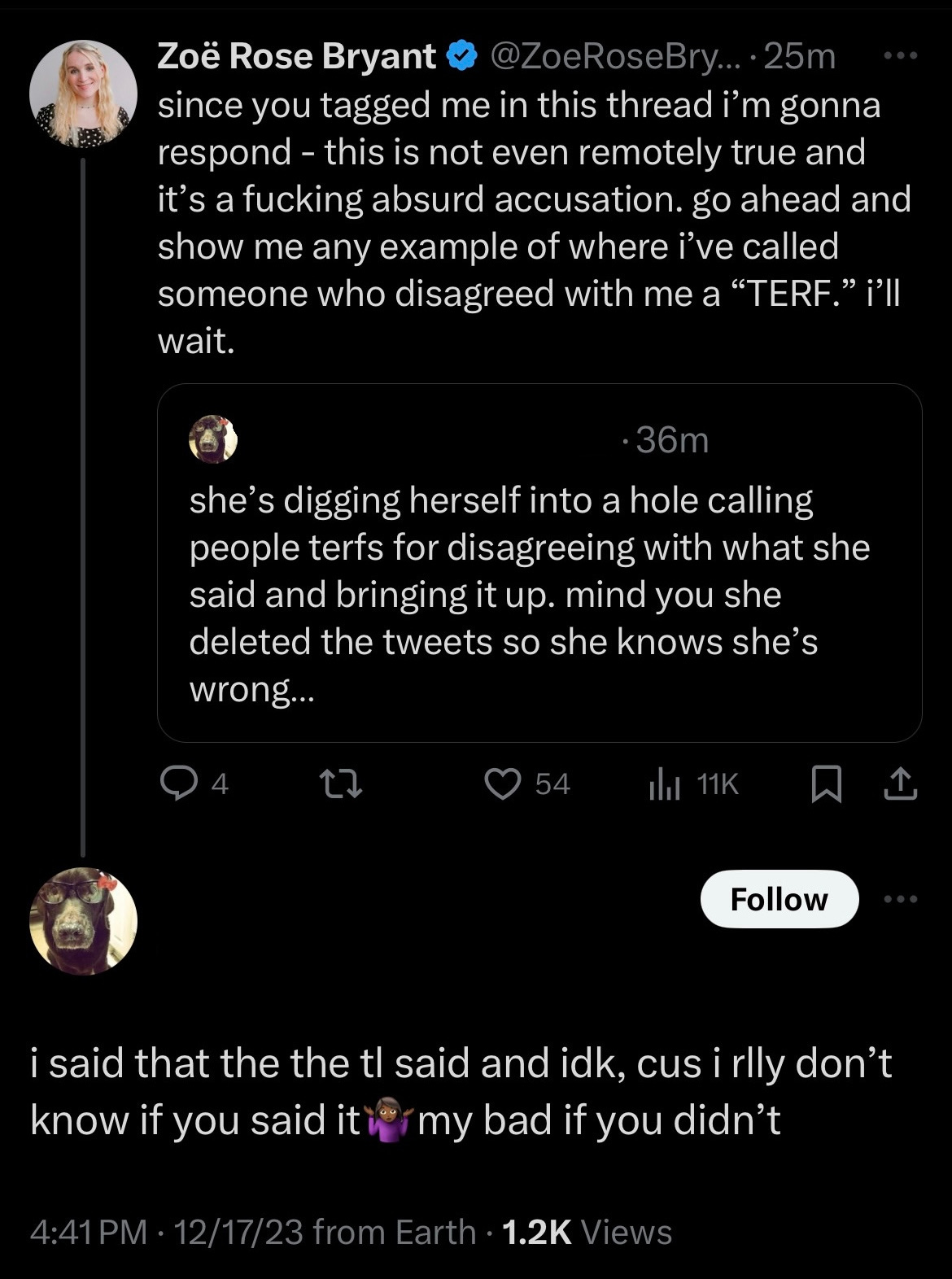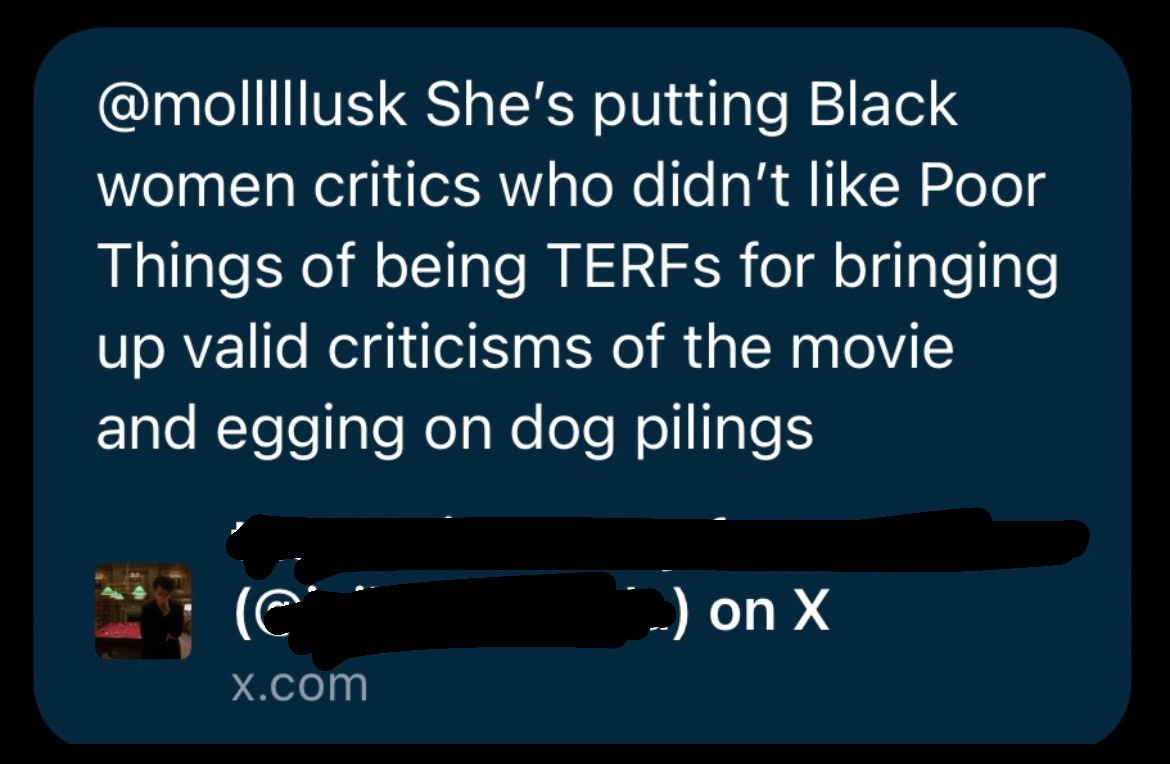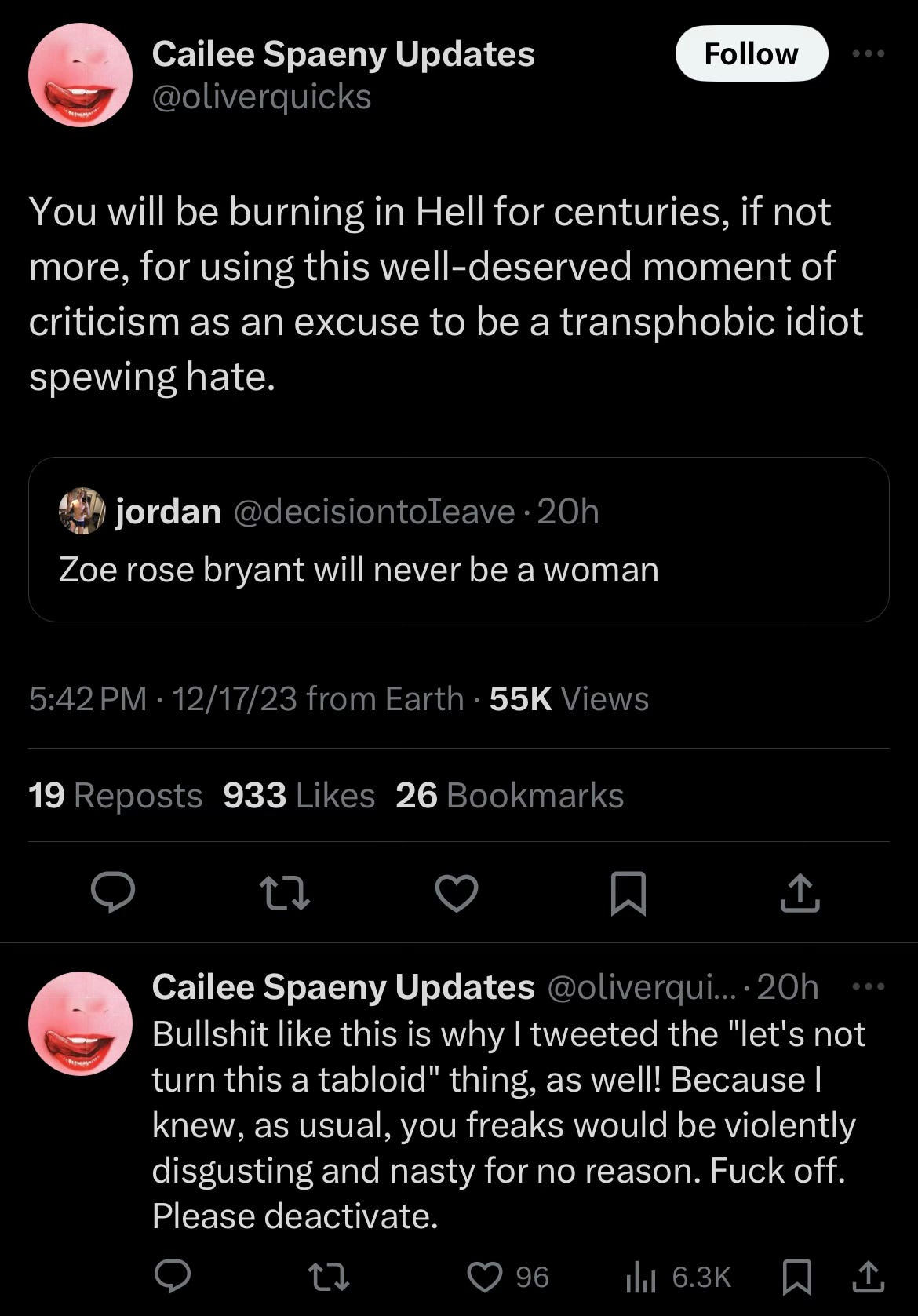setting the story straight.
last friday, i read a negative review about poor things, and i decided to respond to three points in particular about the piece. the fact that it was negative alone was not enough to merit a response - as i obviously believe everyone is entitled to their own opinion on a film, no matter how i personally feel about it - but the nature of these three points had made me want to engage.
the first was that the film is a “male fantasy,” with sex scenes intended only for shock value and a director who is “not interested in the sex lives of women as much as the ways in which a young woman’s body can be positioned and used.” this is a narrative i’ve seen taken hold of criticism at the moment, where films and shows featuring explicit sexual content involving women are accused of being voyeuristic and exploitative simply for existing, with no consideration for the actress’ own emotions surrounding the scenes in question. i think this narrative comes from a good place - given how often actresses have historically been exploited by filmmakers on set and coerced into performing sexual content that makes them uncomfortable, it’s natural to question their intent and necessity in films and shows these days as a way to combat and call out those practices. however, in countless interviews and ads for poor things thus far, emma stone has continually emphasized how she was just as active as a producer in the making of this film as she was as an actress, and how she and yorgos aligned entirely on their creative vision for the project (including said sex scenes) - to suggest anything otherwise, or to remove her input entirely, is not only misleading, but also dangerous in my opinion. whether this was this critic’s intent or not, i felt it was fair to touch on that and write a reminder of emma stone’s agency in this production, which is a crucial element that cannot be overlooked in its criticism.
the second point i wanted to raise referenced two lines made early on in the piece relating to the film’s lack of a portrayal of menstruation. the lines in question were “but there’s a corroded spirit to the story, like it’s intermittently possessed by an edgelord who’s unaware most women menstruate” and “for all the fucking, there is no menstrual blood!” this is a critique i had also seen in another female critic’s negative reaction of poor things, and i think it’s worth noting that both critics are also cisgender. now, as a trans woman - and one of the unfortunately few trans writers in this space - these critiques rubbed me the wrong way, and i also felt compelled to call them out, as i believe some people may hold certain viewpoints that are exclusionary even if they themselves may not be bigoted or prejudiced against the trans community (in fact, i even stated that i did not believe this was the case, but that one’s language can still be unintentionally exclusionary). from my perspective, i thought that the beauty in bella’s evolution was its universality for all women, cis or trans; there is nothing she experiences that is unavailable to any of us, and i think that’s remarkable as this story aims to be a metaphor for all of our liberation. to come down on the film and have a negative reaction to it for not portraying menstruation felt to me like an odd and unnecessary hill to die on, especially as many cis women struggle with menstruation for one reason or another as well (which further makes its inclusion seem less like a necessity), and, as others pointed out, this critique could be waved away by the fact that it’s apparently explained in-film that bella’s reproductive system has been removed entirely, which of course accounts for the absence of menstruation.
lastly, the final point i wished to touch on was a line made towards the end of the piece that says that “Poor Things makes the fatal mistake of thinking the only thing interesting to a liberated woman is herself.” after already finding two other major critiques to be in poor taste, i felt this was another appropriate to note, as this is just factually untrue based on what is presented to us in the film itself. without spoilers, the entire second half of the film follows bella’s newfound awareness of all the suffering in the world and her desire to improve it in any way she can, and from that point forward, sex is merely a means to procure money to continue her education. because of this critique in particular, i simply personally felt that this review was not engaging with the film as it is and instead projecting other beliefs onto it, which felt unfair. yes, the critic in question is 100% entitled to their dissenting opinion, and they should not be attacked for that alone. but i do also believe that critique itself is also worthy of critique, as is the nature of discourse. and so, i took to my timeline to voice these three thoughts separately. (in hindsight, had i taken the time to explain my arguments as in-depth as i have here, we probably could’ve avoided all of this, but that’s on me.)
where i undoubtedly made a mistake was when i made a unnecessary cheeky joke in the midst of relaying my opinions, in which i said “this whole poor things discourse is telling me that we need more film critics who fuck.” given the proximity of this joke to my other tweets, i understand now how it was interpreted as a direct attack on the writer of the review i was critiquing, and that is also 100% on me. however, i would like to clarify that this was not the case in any capacity. this was a joke directed at the entirety of discourse - and the entirety of film criticism - and is something i have also joked about with friends in private over the past few months (and vice versa), especially amidst the “anti sex scene” sentiment that has taken hold of our culture and come for not just poor things this awards season but films like saltburn as well (in fact, when i first made this joke in private months ago, it was initially about sexphobic saltburn discourse instead). with all that being said though, i see now that this is a joke that was not only not received well, but also mistakenly perceived as an attack on one writer in particular, which was never my intention. i do not believe that those who don’t care for or critique the sex scenes in poor things are “virgins” or “simply need to have sex more,” and it was a gross generalization that invalidated the rest of my argument. and for that, i am sorry.
after posting this string of tweets on friday afternoon and going on with my day, i was told by a friend that there was an account that had been relitigating this argument on the timeline and coming down on me again two days later. i looked over their tweets myself and found a variety of misrepresentations of what i had said and what i had meant in my tweets from two days prior (including allegations of “harassment”), and given both this (what i assumed to be) willful misreading and senseless slander, i blocked this user, not regarding them as someone who wanted to engage in thoughtful and respectful criticism, but as someone who simply wanted to stir up trouble.
unfortunately, said user then shared a screenshot of my blocking, and then promptly stated that i was “[ignoring] any criticism and [continuing] acting as though harassing a Black writer and openly insulting their work was totally justified.” not only was this not the case, but it also demonstrated to me again - from my perspective - that this user was not interested in civil discussion about where we disagreed on my remarks the other day and simply wanted to stir up trouble.
to begin, making this an issue of race is not only entirely untrue but also deeply disgusting. nothing i had said two days prior had anything to do with this critic’s race (and in fact, the second critic i critiqued for their note about poor things’ lack of menstruation was white), and in making a false and defamatory statement like that in a tweet that would soon become viral, this user shaped this narrative into something that had no basis in reality. additionally, i never intended to “harass” any writer with my critiques on their assessment of poor things or direct any negative attention their way; i merely meant to push back at what i saw as unfair and untrue critiques, as is, again, the nature of discourse (and i feel it’s also worth noting that the writer of the initial review i referenced is not even on twitter to see my remarks, so it’s not as if those who follow me had gone to attack her in droves). as someone who has received significant online harassment myself, i would never wish that upon anyone. and though i know it can be an unintended effect of engaging in discourse (especially as an account with tens of thousands of followers), that was never what i set out to do here. where i went wrong was my aforementioned immature joke, which i had deleted by the time this twitter user made this claim after seeing how it had been received and taking this critique to heart.
unfortunately, this twitter user continued on this tirade, continuing to make untrue statements that i had labeled those i disagree with as “bigots” or “sexless losers” or “gender traitors” or “TERFs,” which were words i had never used (and in fact, when i pointed out the exclusionary language used by both critics in regards to their opinion on poor things’ lack of menstruation, i specifically focused on their language and not their beliefs).
as a result, tweet after tweet attracted more and more negative attention that evolved from what this user saw as “justifiable criticism” of my initial arguments two days prior to a narrative about me “siccing my followers on Black female journalists” or “calling anyone who disagrees with me a TERF.” and then, as this twitter user admits they “knew would happen,” their vitriolic tweets attracted transphobic attention as well, and the nature of the conversation steered more into attacks on my personality and gender identity than anything i’d ever said in the first place. as a result, as this grew increasingly out of hand and an initial tweet i’d made to attempt to clarify things solved nothing, i temporarily deactivated my account to preserve my own peace and stop seeing all of this discourse entirely.
to this twitter user’s credit, they did call out the transphobia when it started taking place.
with that being said though, what exactly did they think was going to happen after tweeting hyperbolic lies about me for three hours straight, drawing more and more negative attention my way by the minute? in fact, they even said they knew people would be “nasty for no reason.” and nevertheless, they continued on this tirade. this is not someone who wanted to “call me out” or “hold me accountable”; this is someone who just wanted to start drama - and did.
all-in-all, i think there was a much better way everything here could’ve been handled. my arguments about these two poor things reviews are not above critique - just as the reviews themselves are not - and i think there was a discussion there to be had, and it’s also objectively true that my “joke” was out-of-line and had no place in said discussion. with that being said, i also feel that the twitter user who kickstarted this chaos yesterday did not approach this conversation in a civil manner, and instead seemed intent on doing exactly what they had accused me of doing - sending hordes of hate a writer’s way for simply stating their opinions (and unlike the writer of the original review, i am actively on twitter to see, read, and receive it all) - and putting words in my mouth and making grandstanding judgments on my actions regarding a writer’s race and their beliefs about trans people, which spread lies and escalated this situation into something it should’ve never been. still, as i’ve said above, i deeply regret what this discussion became and never meant to harass any writer solely for their opinion on the film, and my attempt at caustic humor was cruel and unwarranted. now, i just hope we can all learn lessons from this and let it be a thing of the past.

